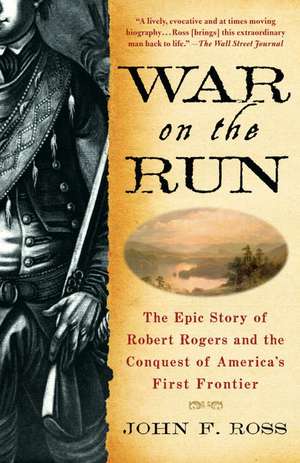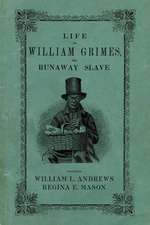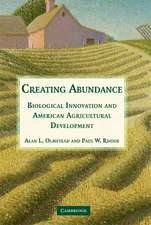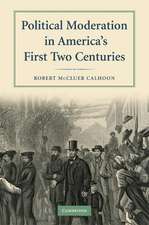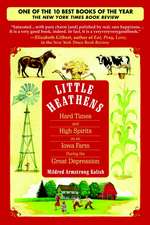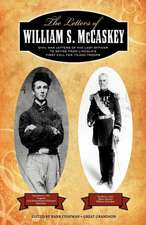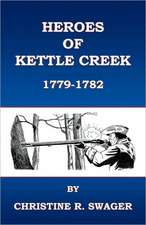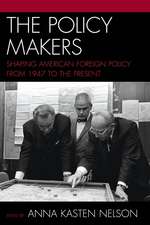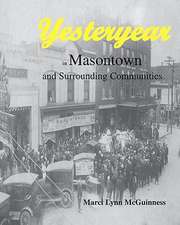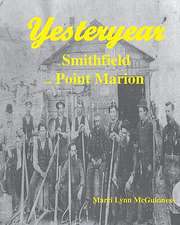War on the Run: The Epic Story of Robert Rogers and the Conquest of America's First Frontier
Autor John F. Rossen Limba Engleză Paperback – 31 mar 2011
Preț: 115.09 lei
Nou
Puncte Express: 173
Preț estimativ în valută:
22.02€ • 23.16$ • 18.20£
22.02€ • 23.16$ • 18.20£
Carte disponibilă
Livrare economică 26 martie-09 aprilie
Preluare comenzi: 021 569.72.76
Specificații
ISBN-13: 9780553384574
ISBN-10: 0553384570
Pagini: 548
Ilustrații: 10 MAPS & ONE 8-PP B&W PHOTO INSERT
Dimensiuni: 134 x 203 x 33 mm
Greutate: 0.45 kg
Editura: Bantam
ISBN-10: 0553384570
Pagini: 548
Ilustrații: 10 MAPS & ONE 8-PP B&W PHOTO INSERT
Dimensiuni: 134 x 203 x 33 mm
Greutate: 0.45 kg
Editura: Bantam
Notă biografică
John F. Ross is executive editor of American Heritage magazine and a former member of the Board of Editors at Smithsonian magazine, where he wrote six cover stories. His articles have been published in Reader’s Digest, Parade, the New York Times, Newsweek, the Washington Post, the Sunday Telegraph, and more. He has appeared on more than fifty radio and television programs and has keynoted conferences across the continent. His organization of the most northern canoe trip ever taken earned him a membership in the Explorers Club. On assignment he has dogsledded with the Polar Inuit in northwestern Greenland, technical mountain climbed in Siberia, and dived 3,000 feet in the Galápagos. He is the author of Living Dangerously and lives in Bethesda, Maryland.
From the Hardcover edition.
From the Hardcover edition.
Extras
Chapter One
Into the Wilderness
This is the forest primeval. The murmuring pines and the hemlocks,
Bearded with moss, and in garments green, indistinct in the twilight,
Stand like Druids of eld, with voices sad and prophetic,
Stand like harpers hoar, with beards that rest on their bosoms.
Loud from its rocky caverns, the deep-voiced neighboring ocean
Speaks, and in accents disconsolate answers the wail of the forest.—
Henry Wadsworth Longfellow, Evangeline
Early one spring morning in 1739 James Rogers cinched the knots securing his family's belongings to an oxcart. Several sacks of corn kernels, some to be used for food, others for seed, huddled among well-worn tools and implements: an ax, a hoe, an iron pot, and a skillet. On the wagon's sill he propped his heavy smoothbore, loaded and primed with powder and shot. The New Hampshire air still carried the lingering bite of winter. Nearby the Spicket River gurgled more quietly than usual, denied its usual springtime roar by two years of drought.
The fir-shaded clearing in front of the small log cabin bustled with even more activity than usual for this characteristically large frontier family. His wife, Mary, brought out the last belongings, while their 13-year old daughter, Martha, looked after her mother's two-year-old namesake. Their five sons—Daniel, 16, Samuel, 14, James, 11, Robert, 7, Richard, 5—dashed around. In November James the elder had bought a one-sixth interest in 2,190 acres of tallgrass meadow and evergreen forest 35 miles northwest of their present 44-acre homestead in Methuen.
During the long winter evenings James had read to the children from his small but choice library, which included the Geneva Bible that he had carried over from Ireland. He may have enthralled them with the resourcefulness of the shipwrecked hero of Robinson Crusoe, one of the few novels forever passing from hand to hand on the frontier. Buried in that grave but spirit-raising adventure lay a moral that resonated with those who ventured into any wilderness: things get done not by wishing but by willing. Perhaps for young Robert, as Friday passed out of the unknown into Robin's service, the story lent strength to the idea that friends could be found in the impassive wilderness.
James may have also read them The Pilgrim's Progress, Bunyan's allegorical epic, in which the highest qualities of worldly adventure sweep through the Slough of Despond and Valley of the Shadow of Death up Hill Difficulty and on to face "Apollyon straddling over the whole breadth of the way" and Giant Despair, fit enemies for journeyers to overcome. After the hardship of the passage on which many would fail, the traveler could expect to enter the truly Celestial City along its streets paved in gold. These tales unlocked doors in the mind that opened to reveal unending vistas of the strange and wonderful. By naming and depicting things dark and mysterious, at first glance unconquerable but that proved vulnerable to hope and light, these tales had the power to awaken energies capable of driving back the inescapable terrors of the unknown.
For years James had yearned to own something more than this little clearing. While the banks of the Spicket returned rich yields of corn, barley, and flax, so confined a tract provided barely enough for him to feed himself, his wife, and seven children and to meet town taxes and their share of the local minister's keep. He and Mary had left Ulster a decade earlier in search of something more than this.
Nonetheless, no one could call the Rogerses poor. They were lucky too. The diphtheria epidemic that ravaged the region between 1735 and 1737 had overleaped them. In those three years it had struck terribly close, choking the life from 256 children in the adjacent town of Haverhill, swelling throats and filling them with ash-colored specks. Death from "throat distemper" came quickly, sometimes in as little as twelve tortured hours, carrying off small children most readily of all. Some families lost five or six children in the space of one nightmarish week. Within one year 984 settlers, 800 of them children under ten, had been swept away, not quite five percent of the entire New Hampshire colony.
James also looked forward to escaping the rarely hidden contempt shown by so many established colonists toward him and his fellow Scots-Irish. Ever since the Reverend Jamie MacGregor led the first wave of Ulster Presbyterians to northern New England 22 years before, the Puritans had made their lives difficult. In these proud, poor, and often violent newcomers, the older order found much to dislike: pride beyond their meanly assigned station and a spirited disregard for authority. Antipathy ran so deep that the Puritans even regarded the potato, which MacGregor's flock introduced to the region, as a fruit of the devil, a pernicious root unfit for Christian stomachs, imputing to it—with an imagination that told more about the imaginers than it did about the humble esculent—aphrodisiac powers.
John Greenleaf Whittier would capture this hostility by quoting an anonymous balladeer's gloating depiction of how, in the spring of 1719, the townsfolk of Haverhill had watched with amusement as an immigrant canoe heading upriver to MacGregor's settlement of Londonderry capsized in the rapids:
They began to scream and bawl,
As out they tumbled one and all,
And, if the Devil had spread his net,
He could have made a glorious haul!
In 1729 a Boston mob prevented a shipload of Ulster immigrants from coming ashore, leaving the sea-weary people to work their way up the Maine coast before they could set foot on land. Early-eighteenth-century New England was a homogeneous closed society, its coastal towns ruled by a religious elite who felt the hand of God's ordainments on their actions and policed obedience to the community with stifling social pressures. The newcomers struck at the heart of those iron conventions that had enabled the Puritan order to establish itself and survive in the New World. They spoke in a thick brogue, drank heavily, fought often, and spoke their minds when not asked. Their women often dressed provocatively. They prayed standing, not on their knees, like warriors gaining a promised land.
Although they worshipped a Protestant deity, their association, if only by geographical proximity in Ulster, with the Catholic Irish awoke deep fears among the Puritans. These first New Englanders had contended for decades with the papists of New France, who periodically whipped up the more or less converted Eastern Woodland peoples into murderous raids on the English settlements.
Rogers's ancestors knew something about Old World bloodshed. For many centuries violence consumed the basin of the upper Irish Sea: northern Ireland, the southern lowlands of Scotland, and the hills and valleys of northern England. In the past 700 years only three English monarchs had not invaded Scotland or found themselves defending their bloody borderlands against their northern neighbors. These windswept and treeless lands harbored tough, poor people who operated as often as not outside the reach of the law. Clans frequently sent bands "reiving" or preying on their neighbors. Cattle rustling and levying blackmail (then the term for protection money) was an enduring way of life, not an extreme remedy. Violence pervaded all aspects of these marginal men's lives to such a degree that weddings often featured simulated kidnappings of the bride, the groom and his friends joining together to "rescue" her. Such border violence hardened kinship relationships, often at the expense of allegiance to the distant Crown.
In the early 1600s James Rogers's forebears and thousands of other land-hungry border Scots had crossed the Northern Channel to settle the nine counties forming the northernmost province of Ireland. By the early 1700s conditions for the Scots Presbyterians of Ulster had deteriorated. The "rackrenting" practices of their absentee English landlords opened up leased property, long deemed to be held by perpetual hereditary right, to the highest bidder. Often several Irish Catholic families combined to outbid one Scots-Irish family, generations of which had toiled to improve the holding. New religious restrictions under Queen Anne ratcheted up resentment, while drought and economic depression added to their settler woes. In 1717 a first trickle of emigration to America began, swelling into a flood over the next 48 years as more than 150,000 people from Northern Ireland, mostly of Scots-Irish stock, set off.
Sometime between 1728 and 1731 James Rogers, his young wife Mary, and their four children, perhaps rackrented out of their home in Londonderry, joined the exodus, landing in Boston. Luck blessed them with a safe passage, albeit of two long months, though many of their fellow voyagers fell prey not only to the seas but to the callous merchants who jammed their vessels far beyond capacity with human cargo. On average, nearly a third of the passengers died. The parents of Robert Rogers's good friend John Stark lost all three of their young children to the foul holds.
The northeastern town of Methuen, on the Merrimack River just west of Haverhill, did not exactly embrace the Rogers family, but practicality often overrode dogma in America's always labor-poor interior. The elders—some 65 taxpaying men—sold them small parcels from the common pasture on the northern edge of town: these newcomers in their rough but defensible log cabins could serve as a first line of resistance to the fierce raiders from the north. Rogers's young sons would eventually enter the ranks of the all-too-often-mustered militia. On the Sabbathday, November 14, 1731, the town's young minister, Christopher Sargent, baptized one-week-old Robert, his family's first child born in North America, in the clapboard Congregationalist church on Meeting House Hill.
James Rogers made friends with his neighbor, Joseph Pudney, a former shopkeeper from Salem who also dreamed that the dangers of settling deeper into the wilderness would be more than offset by the scope and freedom there to be won. Pudney had much in common with Rogers, notably a houseful of children and a determination to better himself whatever the price in risk and labor. The two formed a plan to settle in the Great Meadows, a favorite hunting spot of theirs, 35 rough but promising miles northwest of Methuen: Rogers had purchased 365 acres for 11 pounds; Pudney received his title on an adjacent tract 12 days later.
The Rogers's oxcart pulled out, followed by haltered livestock—a couple of cows and a horse—and the ragtag procession joined the Pudneys to trudge along the banks of the Merrimack to Haverhill, where they picked up what passed for a road leading northwest to Rumford (today's Concord, New Hampshire), which had been hacked through the forest 13 years earlier. The travelers, perhaps the first oxcart party since the winter, encountered blowdowns—large toppled trees whose sprawling branches had to be axed away. The cart had no brakes, so James and his strongest sons had to maneuver the heavy loads with care down every incline. The road jogged around massive granite boulders, scattered across the landscape as if some Brobdingnagian child had been playing at marbles. A traveler in the eighteenth century noted that moss grew so thick on some trees that it fell in tufts like long hair. In places the forest fir, spruce, oak, yellow birch, elm, and sugar maple gave way to spruce bogs thick with rotting tree trunks, their waters dark from the wood's decay.
At the yet-smaller town of Chester, 15 miles from Haverhill, the caravan turned west toward the Merrimack, along Cohas Brook, its banks lined with magnificent specimens of arrow-straight white pine (cohas in Algonquin), some towering 250 feet and stretching eight feet across. The Crown had laid claim to these trees for the masts and spars of its world-class Royal Navy. Every ship of the line required a mainmast at least 40 inches in diameter and 40 yards in height, as well as foremasts, mainyards, bowsprits, mizzenmasts nearly as formidable. When a gust of wind passed through these cathedral groves as yet untouched by ax, the canopies shook and sighed like the murmur of a distant sea.
Rogerses and Pudneys crossed the Merrimack on John Goffe Jr.'s ferry, then took an even rougher track along the west bank to Amoskeag Falls, the most powerful stretch of white water along all the river's 110 miles. Half a mile north Black Brook, so named from the inkiness of its water, fell into the Merrimack from the west, and as the weary party swung upstream, the reality of their commitment now settled upon the youngest. Cutting back saplings and cajoling the oxen, they embarked on the last eight-mile push, their pace by now a crawl. They slept underneath the wagons, some kept awake by the howls of a nearby wolf pack that smelled the uneasy livestock. Not too many years before and not a dozen miles from where they lay, Zerobbabel Snow had been treed by wolves at dusk while out hunting. Frantically he blazed away with his fowling piece, but the pack stood its ground. His lead running out, he shot his coat buttons at the gray shadows. Only the next morning's daylight finally chased them away. While wolves rarely if ever attack humans, black bears and catamounts—mountain lions—do. Catamounts can measure up to nine feet from nose to tail and weigh up to 200 pounds. Around that time a ten-square-mile section of deciduous hardwoods in eastern North America might have maintained five black bears, two or three catamounts, and one to three gray wolves, as well as two elk, 30 red foxes, 400 deer, 200 turkeys, and up to 20,000 squirrels.
What relief must the incomers have felt when they finally parted the last branches and beheld the Great Meadows, a beaver-cleared opening of tallgrass in the interminable forest, reaching uphill and enclosed by forest. A stream ran through it, filling a large beaver pond at their feet. James and Mary Rogers named their homestead Mountalona, in memory of the Mounterloney Mountains of the Ireland they had left behind.
The two families threw up a crude log habitation known as a "half-faced camp." Two forked posts dug into the ground about ten feet apart supported a pole, up against which were stacked small horizontal logs, one side left open and roofed with bark. This makeshift shelter would house the livestock once the cabin was built.
The main cabin was wrought of tree trunks, split through the middle or "squared on the rough," and placed on each other to form a rectangle. Saddle notches cut into the ends of each log afforded a basic fit. The cabin required no nails to be hammered or sockets to be made in the some 80 logs, 20 to 30 feet in length; split logs were used for roof. The cabin the Rogerses built that spring and summer consisted of a single large room, divided by quilts hanging from ropes stretched between hooks in the rafters. At bedtime the children climbed a ladder into a loft and fell asleep under bearskins teeming with fleas and lice. A plank door and shutters closed out the elements. Bark shingle or pine clapboards covered the roof. Old World flourishes may have decorated the cabin, perhaps a double cross on the door, witch hazel and lilac bushes in the yard, and witch balls on the roof to keep away evil spirits.
From the Hardcover edition.
Into the Wilderness
This is the forest primeval. The murmuring pines and the hemlocks,
Bearded with moss, and in garments green, indistinct in the twilight,
Stand like Druids of eld, with voices sad and prophetic,
Stand like harpers hoar, with beards that rest on their bosoms.
Loud from its rocky caverns, the deep-voiced neighboring ocean
Speaks, and in accents disconsolate answers the wail of the forest.—
Henry Wadsworth Longfellow, Evangeline
Early one spring morning in 1739 James Rogers cinched the knots securing his family's belongings to an oxcart. Several sacks of corn kernels, some to be used for food, others for seed, huddled among well-worn tools and implements: an ax, a hoe, an iron pot, and a skillet. On the wagon's sill he propped his heavy smoothbore, loaded and primed with powder and shot. The New Hampshire air still carried the lingering bite of winter. Nearby the Spicket River gurgled more quietly than usual, denied its usual springtime roar by two years of drought.
The fir-shaded clearing in front of the small log cabin bustled with even more activity than usual for this characteristically large frontier family. His wife, Mary, brought out the last belongings, while their 13-year old daughter, Martha, looked after her mother's two-year-old namesake. Their five sons—Daniel, 16, Samuel, 14, James, 11, Robert, 7, Richard, 5—dashed around. In November James the elder had bought a one-sixth interest in 2,190 acres of tallgrass meadow and evergreen forest 35 miles northwest of their present 44-acre homestead in Methuen.
During the long winter evenings James had read to the children from his small but choice library, which included the Geneva Bible that he had carried over from Ireland. He may have enthralled them with the resourcefulness of the shipwrecked hero of Robinson Crusoe, one of the few novels forever passing from hand to hand on the frontier. Buried in that grave but spirit-raising adventure lay a moral that resonated with those who ventured into any wilderness: things get done not by wishing but by willing. Perhaps for young Robert, as Friday passed out of the unknown into Robin's service, the story lent strength to the idea that friends could be found in the impassive wilderness.
James may have also read them The Pilgrim's Progress, Bunyan's allegorical epic, in which the highest qualities of worldly adventure sweep through the Slough of Despond and Valley of the Shadow of Death up Hill Difficulty and on to face "Apollyon straddling over the whole breadth of the way" and Giant Despair, fit enemies for journeyers to overcome. After the hardship of the passage on which many would fail, the traveler could expect to enter the truly Celestial City along its streets paved in gold. These tales unlocked doors in the mind that opened to reveal unending vistas of the strange and wonderful. By naming and depicting things dark and mysterious, at first glance unconquerable but that proved vulnerable to hope and light, these tales had the power to awaken energies capable of driving back the inescapable terrors of the unknown.
For years James had yearned to own something more than this little clearing. While the banks of the Spicket returned rich yields of corn, barley, and flax, so confined a tract provided barely enough for him to feed himself, his wife, and seven children and to meet town taxes and their share of the local minister's keep. He and Mary had left Ulster a decade earlier in search of something more than this.
Nonetheless, no one could call the Rogerses poor. They were lucky too. The diphtheria epidemic that ravaged the region between 1735 and 1737 had overleaped them. In those three years it had struck terribly close, choking the life from 256 children in the adjacent town of Haverhill, swelling throats and filling them with ash-colored specks. Death from "throat distemper" came quickly, sometimes in as little as twelve tortured hours, carrying off small children most readily of all. Some families lost five or six children in the space of one nightmarish week. Within one year 984 settlers, 800 of them children under ten, had been swept away, not quite five percent of the entire New Hampshire colony.
James also looked forward to escaping the rarely hidden contempt shown by so many established colonists toward him and his fellow Scots-Irish. Ever since the Reverend Jamie MacGregor led the first wave of Ulster Presbyterians to northern New England 22 years before, the Puritans had made their lives difficult. In these proud, poor, and often violent newcomers, the older order found much to dislike: pride beyond their meanly assigned station and a spirited disregard for authority. Antipathy ran so deep that the Puritans even regarded the potato, which MacGregor's flock introduced to the region, as a fruit of the devil, a pernicious root unfit for Christian stomachs, imputing to it—with an imagination that told more about the imaginers than it did about the humble esculent—aphrodisiac powers.
John Greenleaf Whittier would capture this hostility by quoting an anonymous balladeer's gloating depiction of how, in the spring of 1719, the townsfolk of Haverhill had watched with amusement as an immigrant canoe heading upriver to MacGregor's settlement of Londonderry capsized in the rapids:
They began to scream and bawl,
As out they tumbled one and all,
And, if the Devil had spread his net,
He could have made a glorious haul!
In 1729 a Boston mob prevented a shipload of Ulster immigrants from coming ashore, leaving the sea-weary people to work their way up the Maine coast before they could set foot on land. Early-eighteenth-century New England was a homogeneous closed society, its coastal towns ruled by a religious elite who felt the hand of God's ordainments on their actions and policed obedience to the community with stifling social pressures. The newcomers struck at the heart of those iron conventions that had enabled the Puritan order to establish itself and survive in the New World. They spoke in a thick brogue, drank heavily, fought often, and spoke their minds when not asked. Their women often dressed provocatively. They prayed standing, not on their knees, like warriors gaining a promised land.
Although they worshipped a Protestant deity, their association, if only by geographical proximity in Ulster, with the Catholic Irish awoke deep fears among the Puritans. These first New Englanders had contended for decades with the papists of New France, who periodically whipped up the more or less converted Eastern Woodland peoples into murderous raids on the English settlements.
Rogers's ancestors knew something about Old World bloodshed. For many centuries violence consumed the basin of the upper Irish Sea: northern Ireland, the southern lowlands of Scotland, and the hills and valleys of northern England. In the past 700 years only three English monarchs had not invaded Scotland or found themselves defending their bloody borderlands against their northern neighbors. These windswept and treeless lands harbored tough, poor people who operated as often as not outside the reach of the law. Clans frequently sent bands "reiving" or preying on their neighbors. Cattle rustling and levying blackmail (then the term for protection money) was an enduring way of life, not an extreme remedy. Violence pervaded all aspects of these marginal men's lives to such a degree that weddings often featured simulated kidnappings of the bride, the groom and his friends joining together to "rescue" her. Such border violence hardened kinship relationships, often at the expense of allegiance to the distant Crown.
In the early 1600s James Rogers's forebears and thousands of other land-hungry border Scots had crossed the Northern Channel to settle the nine counties forming the northernmost province of Ireland. By the early 1700s conditions for the Scots Presbyterians of Ulster had deteriorated. The "rackrenting" practices of their absentee English landlords opened up leased property, long deemed to be held by perpetual hereditary right, to the highest bidder. Often several Irish Catholic families combined to outbid one Scots-Irish family, generations of which had toiled to improve the holding. New religious restrictions under Queen Anne ratcheted up resentment, while drought and economic depression added to their settler woes. In 1717 a first trickle of emigration to America began, swelling into a flood over the next 48 years as more than 150,000 people from Northern Ireland, mostly of Scots-Irish stock, set off.
Sometime between 1728 and 1731 James Rogers, his young wife Mary, and their four children, perhaps rackrented out of their home in Londonderry, joined the exodus, landing in Boston. Luck blessed them with a safe passage, albeit of two long months, though many of their fellow voyagers fell prey not only to the seas but to the callous merchants who jammed their vessels far beyond capacity with human cargo. On average, nearly a third of the passengers died. The parents of Robert Rogers's good friend John Stark lost all three of their young children to the foul holds.
The northeastern town of Methuen, on the Merrimack River just west of Haverhill, did not exactly embrace the Rogers family, but practicality often overrode dogma in America's always labor-poor interior. The elders—some 65 taxpaying men—sold them small parcels from the common pasture on the northern edge of town: these newcomers in their rough but defensible log cabins could serve as a first line of resistance to the fierce raiders from the north. Rogers's young sons would eventually enter the ranks of the all-too-often-mustered militia. On the Sabbathday, November 14, 1731, the town's young minister, Christopher Sargent, baptized one-week-old Robert, his family's first child born in North America, in the clapboard Congregationalist church on Meeting House Hill.
James Rogers made friends with his neighbor, Joseph Pudney, a former shopkeeper from Salem who also dreamed that the dangers of settling deeper into the wilderness would be more than offset by the scope and freedom there to be won. Pudney had much in common with Rogers, notably a houseful of children and a determination to better himself whatever the price in risk and labor. The two formed a plan to settle in the Great Meadows, a favorite hunting spot of theirs, 35 rough but promising miles northwest of Methuen: Rogers had purchased 365 acres for 11 pounds; Pudney received his title on an adjacent tract 12 days later.
The Rogers's oxcart pulled out, followed by haltered livestock—a couple of cows and a horse—and the ragtag procession joined the Pudneys to trudge along the banks of the Merrimack to Haverhill, where they picked up what passed for a road leading northwest to Rumford (today's Concord, New Hampshire), which had been hacked through the forest 13 years earlier. The travelers, perhaps the first oxcart party since the winter, encountered blowdowns—large toppled trees whose sprawling branches had to be axed away. The cart had no brakes, so James and his strongest sons had to maneuver the heavy loads with care down every incline. The road jogged around massive granite boulders, scattered across the landscape as if some Brobdingnagian child had been playing at marbles. A traveler in the eighteenth century noted that moss grew so thick on some trees that it fell in tufts like long hair. In places the forest fir, spruce, oak, yellow birch, elm, and sugar maple gave way to spruce bogs thick with rotting tree trunks, their waters dark from the wood's decay.
At the yet-smaller town of Chester, 15 miles from Haverhill, the caravan turned west toward the Merrimack, along Cohas Brook, its banks lined with magnificent specimens of arrow-straight white pine (cohas in Algonquin), some towering 250 feet and stretching eight feet across. The Crown had laid claim to these trees for the masts and spars of its world-class Royal Navy. Every ship of the line required a mainmast at least 40 inches in diameter and 40 yards in height, as well as foremasts, mainyards, bowsprits, mizzenmasts nearly as formidable. When a gust of wind passed through these cathedral groves as yet untouched by ax, the canopies shook and sighed like the murmur of a distant sea.
Rogerses and Pudneys crossed the Merrimack on John Goffe Jr.'s ferry, then took an even rougher track along the west bank to Amoskeag Falls, the most powerful stretch of white water along all the river's 110 miles. Half a mile north Black Brook, so named from the inkiness of its water, fell into the Merrimack from the west, and as the weary party swung upstream, the reality of their commitment now settled upon the youngest. Cutting back saplings and cajoling the oxen, they embarked on the last eight-mile push, their pace by now a crawl. They slept underneath the wagons, some kept awake by the howls of a nearby wolf pack that smelled the uneasy livestock. Not too many years before and not a dozen miles from where they lay, Zerobbabel Snow had been treed by wolves at dusk while out hunting. Frantically he blazed away with his fowling piece, but the pack stood its ground. His lead running out, he shot his coat buttons at the gray shadows. Only the next morning's daylight finally chased them away. While wolves rarely if ever attack humans, black bears and catamounts—mountain lions—do. Catamounts can measure up to nine feet from nose to tail and weigh up to 200 pounds. Around that time a ten-square-mile section of deciduous hardwoods in eastern North America might have maintained five black bears, two or three catamounts, and one to three gray wolves, as well as two elk, 30 red foxes, 400 deer, 200 turkeys, and up to 20,000 squirrels.
What relief must the incomers have felt when they finally parted the last branches and beheld the Great Meadows, a beaver-cleared opening of tallgrass in the interminable forest, reaching uphill and enclosed by forest. A stream ran through it, filling a large beaver pond at their feet. James and Mary Rogers named their homestead Mountalona, in memory of the Mounterloney Mountains of the Ireland they had left behind.
The two families threw up a crude log habitation known as a "half-faced camp." Two forked posts dug into the ground about ten feet apart supported a pole, up against which were stacked small horizontal logs, one side left open and roofed with bark. This makeshift shelter would house the livestock once the cabin was built.
The main cabin was wrought of tree trunks, split through the middle or "squared on the rough," and placed on each other to form a rectangle. Saddle notches cut into the ends of each log afforded a basic fit. The cabin required no nails to be hammered or sockets to be made in the some 80 logs, 20 to 30 feet in length; split logs were used for roof. The cabin the Rogerses built that spring and summer consisted of a single large room, divided by quilts hanging from ropes stretched between hooks in the rafters. At bedtime the children climbed a ladder into a loft and fell asleep under bearskins teeming with fleas and lice. A plank door and shutters closed out the elements. Bark shingle or pine clapboards covered the roof. Old World flourishes may have decorated the cabin, perhaps a double cross on the door, witch hazel and lilac bushes in the yard, and witch balls on the roof to keep away evil spirits.
From the Hardcover edition.
Recenzii
“A lively, evocative and at times moving biography . . . Ross [brings] this extraordinary man back to life.”—The Wall Street Journal
“Nothing less than a tour de force that will appeal to a wide range of readers . . . This remarkable book should go far to rescue a once-famous figure in American history.”—Winston-Salem Journal
“In this exhaustive book, variously scholarly and white-knuckle exciting, John Ross has done the great man justice.”—The Washington Times
“Rousing . . . The story of Rogers, as told by Ross, is an American tale.”—Pittsburgh Post-Gazette
“[A] sweeping account . . . a thrilling narrative.”—The Boston Globe
“Nothing less than a tour de force that will appeal to a wide range of readers . . . This remarkable book should go far to rescue a once-famous figure in American history.”—Winston-Salem Journal
“In this exhaustive book, variously scholarly and white-knuckle exciting, John Ross has done the great man justice.”—The Washington Times
“Rousing . . . The story of Rogers, as told by Ross, is an American tale.”—Pittsburgh Post-Gazette
“[A] sweeping account . . . a thrilling narrative.”—The Boston Globe
